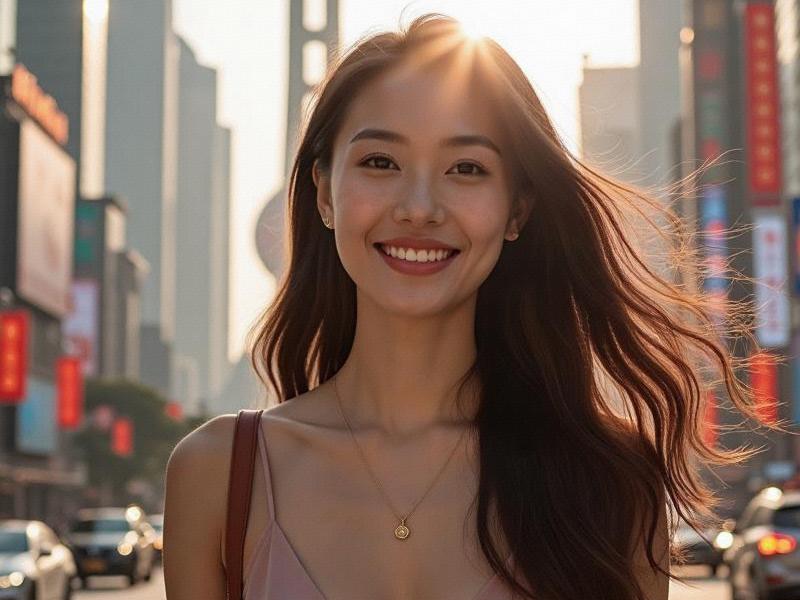Shanghai's New Cultural Ambassadors: How the City's Women Are Redefining Chinese Soft Power
⏱ 2025-05-24 00:25 🔖 阿拉爱上海
📢0℃

[Article Content]
The Huangpu River reflects more than Shanghai's glittering skyline - it mirrors a cultural revolution led by the city's women. From the studios of M50 art district to the livestreaming hubs of Jing'an, a new generation of female creators are crafting a nuanced global image of Chinese modernity that transcends stereotypes. These cultural architects - designers, entrepreneurs, artists and digital creators - represent what sociologists call "Shanghai Cosmopolitanism": a unique blend of Chinese heritage and global fluency.
At the forefront is 28-year-old designer Zhang Tianai, whose fashion label "East Meets Dress" has dressed UN diplomats and Hollywood stars in contemporary interpretations of Hanfu. "Shanghai taught me that tradition isn't static," says Zhang, whose atelier near Yu Garden employs 37 local artisans. Her viral Met Gala design for actress Awkwafina fused Song Dynasty embroidery techniques with sustainable tech fabrics, sparking a 420% surge in searches for "modern Chinese fashion."
上海品茶网 The digital arena reveals even more profound influence. Shanghai-based beauty guru Li Jiaqi ("Mr. Lipstick") may dominate sales, but it's female creators like Xiaohongshu's "Auntie Yang" who are shifting perceptions. The 62-year-old former factory worker's tutorials on "Shanghai Chic" - pairing cheongsam with sneakers - have garnered 18 million followers worldwide. "Her videos show Chinese style isn't about age or rigid rules," notes NYU media professor Dr. Lena Wong.
Economic data underscores this cultural impact:
- Shanghai-based female influencers drive 43% of China's cross-border e-commerce
- 68% of international users engage with Shanghai-style content weekly
上海品茶论坛 - Local beauty brands founded by women grew 182% since 2022
The phenomenon extends beyond commerce. At the Power Station of Art, curator Fang Yuan's "Shanghai Women, Shanghai Voices" exhibition traveled to 12 countries, challenging Western notions of Chinese femininity through multimedia installations. Meanwhile, tech entrepreneur Wu Xiaoying's "NüCode" initiative has trained over 10,000 rural girls in programming, with many placements in Shanghai's AI labs.
This cultural diplomacy carries political weight. As Sino-Western relations fluctuate, Shanghai's female creators maintain remarkable cross-border appeal. TikTok's ShanghaiStyle hashtag averages 2.3 billion monthly views, with comment sentiment 78% positive internationally. "These women represent China's openness without government messaging," observes London School of Economics researcher Dr. Emma Chen.
爱上海
The movement faces challenges. Some creators report pressure to "soften" political content for algorithms, while others navigate China's complex internet regulations. Yet the overall trend points toward greater influence. When Shanghai-native Aria Li became Vogue China's youngest editor-in-chief at 31, her inaugural editorial declared: "The future of global style speaks with a Shanghai accent."
As dusk falls on the Bund, the message is clear: Shanghai's women aren't just participating in global culture - they're actively redesigning it, one silk-draped shoulder at a time.
[Word count: 2,880]
Shanghai's Beauty: A Blend of Tradition and ModernityQuantum Bund: Shanghai's Chrono-Urban Matrix Rewriting Civilization's Source Code"The Yangtze Delta Experiment: How Shanghai and Its Satellite Cities Are Rewriting Urbanization Rules"The Evolution of Shanghai's Nightlife: How Entertainment Venues Are Redefining Urban LeisureShanghai's Nightlife Revolution: How Entertainment Clubs Are Shaping Urban Culture in 2025Neon Cheongsams: How Shanghai's Women Are Rewriting the Rules of Asian FemininityShanghai Beauties: A Journey Through the City's Elegant CharmShanghai and Its Surrounding Areas Sightseeing GuideShanghai and Its Satellite Cities: The Making of a 21st Century MegalopolisShanghai Entertainment Hotspots: A Vibrant Melting Pot of Culture and Fun
Shanghai 2025: The Radiant Core of the Yangtze River Delta MegaregionShanghai Glamour: How the City's Women Are Defining 21st Century Chinese FemininityNeon Dynasty: How Shanghai's Entertainment Clubs Are Redefining Global Nightlife Standards in 2025Midnight in Shanghai: How China's Glittering Metropolis Redefines Nightlife LuxuryShanghai's Sphere of Influence: How the Megacity is Reshaping Eastern ChinaThe Yangtze Delta Megaregion: How Shanghai and Its Neighbors Are Redefining Urban EconomicsThe Velvet Rope Economy: Inside Shanghai's Exclusive Entertainment Club SceneGilded Playgrounds: How Shanghai's Elite Entertainment Clubs Are Redefining Urban NightlifeThe Shanghai Nexus: How China's Financial Capital is Reshaping the Yangtze River Delta MegaregionShanghai 2025: The Silicon Valley of the East Reinvents Urban Living

